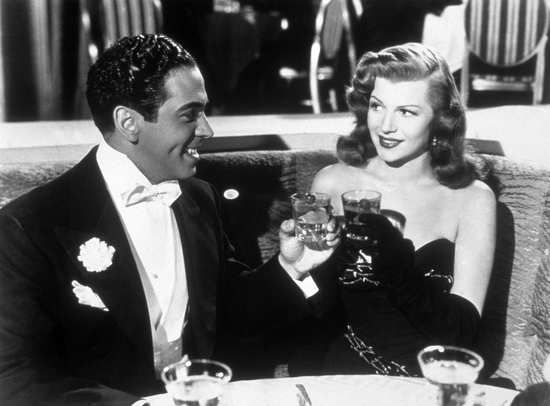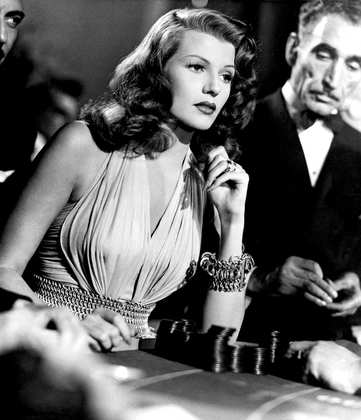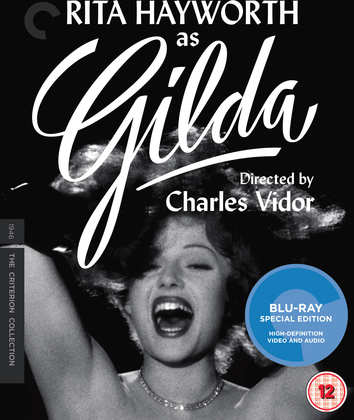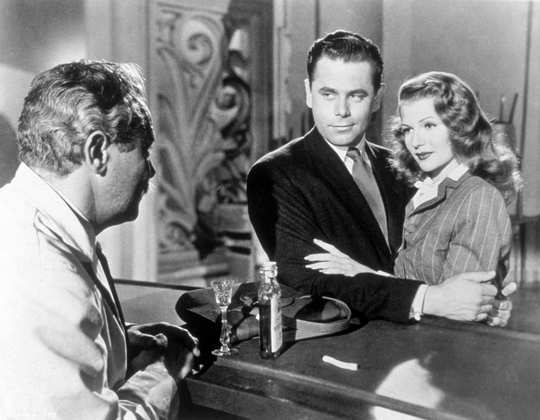Review for Gilda
‘Gilda’ is another exceptional edition of an exceptional film. Criterion, whilst relatively new to the UK, continue to raise the bar with this release with an exceptional transfer and a flawless Blu-ray that lets you see the film as intended. Beautiful shots of beautiful people although it’s anything but a fairy-tale.
‘Gilda’ is a tough film to categorise. It’s full of Hollywood glamour, with Rita Hayworth positively sizzling in the title role with the moodily handsome Glenn Ford looking every bit her equal. It’s a film full of film noir-like dialogue and shots, with deep, satisfyingly dark contrast. But this is no gangster film. It’s an oddly moralistic melodrama that is both strange and dark, playing out like cross between a David Lynch film and classic noir, like ‘Laura’. In short, whilst this is 100% Hollywood glamour, there’s also plenty for those with a penchant for psycho-analysis to get their teeth into too.
‘Gilda’ was made in 1946, the same year as ‘The Big Sleep’ and a dozen other classic noirs. It was directed by Charles Vidor and starred Rita Hayworth as a beautiful, wild-cat femme fatale alongside Glenn Ford as a young chancer, making his living cheating at street dice games and cards whenever he gets a chance. Shot by renowned cinematographer Rudolph Maté, it was greatly enhanced stylistically with lush sets and incredible costumes (well, Rita’s anyway) designed by Jean Louis. It was also well known for its inclusion of a couple of songs, mimed by Hayworth with some aplomb (which could not be said of her faux guitar playing – ouch!), which included "Put the Blame on Mame" and "Amado Mio", sung by Anita Ellis.
The film kicks off with what seems like a straight-forward enough narrative. Johnny Farrell (Glenn Ford), a small-time gambler arrives in Buenos Aires, Argentina, down at hill and a little worse for wear.
He soon sniffs out a game of craps to cheat the locals out of their hard-earned loot but as he makes his getaway he is robbed at knife-point, before he is saved by a complete stranger, the slightly sinister, scarred Ballin Mundson (George Macready) whose walking stick hides a flick blade out of its point (some twenty years before Steed in The Avengers took to using a similar device in his brolly).
Mundson takes pity on him and invites him to an illegal high-class casino, warning him not to try cheating if he does. Once there, the temptation to cheat is too great for Farrell who is caught cheating at Blackjack and taken by two bouncers to see their boss who turns out to be Mundson. Farrell persuades Mundon to hire him and before long he becomes Mundon’s closest confidante and colleague – always watching his back and ensuring that the casino runs smoothly. So all is good.
But then Munson returns from a trip with a beautiful new wife who he introduces to Farrell; Gilda (Rita Hayworth), who makes an incredible entrance bobbing into frame from the bottom in mid-shot and throwing her hair back to reveal a sultry beauty.
But when their eyes meet it’s clear that the two have history which they both have no intention of sharing with Munson who has become an economic saviour to them both in different ways.
Mundson may suspect there is something awry when he starts to insist that Johnny becomes his and Gilda’s constant companion, as well as Gilda’s chaperone. Is he testing Johnny’s loyalty? Or Gilda’s? Or both? Whatever the case, it’s mighty weird.
It’s tough to see whether Gilda and Johnny are in love or hate each other. Gilda makes no secret of taking lover after lover, much to Johnny’s annoyance. But is that because he has the boss’s interest at heart or because he is in love with Gilda himself?
It transpires that Mundson’s casino is actually just a playful front for a more serious business – a cartel to monopolise tungsten. The cartel agrees to have Mundston front it in his name to avoid implication during a very profitable war, but when the war ends, Mundston refuses to transfer ownership. Cue the police, the backers and dozens of others, all looking for Mundston. After he kills a man, Mundston flees in a seaplane which explodes shortly after take-off, presumably a suicide.
So when Gilda inherits his estate she marries Johhny, blissfully unaware that he sugar-daddy husband is alive and kicking. But Johnny decides to teach Gilda a lesson, misunderstanding her motives for flirting with so many other men (to make him jealous) and he effectively imprisons her.
But like all great films, there is a twist in the tale which I won’t spoil here.
As a Criterion release, you’d expect some good contextual extras and there are a couple of note. Eddie Muller, the film noir expert, gives a really good, informative interview, focussing on the film’s layered meanings and sub-texts.
There’s also a decent if somewhat laid back audio commentary from Richard Schickel, film historian.
Finally, 2010 interviews with Directors Martin Scorsese and Baz Lurhmann who both clearly love the film – Scorsese for its dark, noir and Lurhmann waxing over Hayworth’s Hollywood magnetism and the stylish look of the film.
There’s an episode of the 1964 ‘Hollywood and the Stars’ TV show, ‘The Odyssey of Rita Hayworth’, narrated by Joseph Cotten, best man at Hayworth’s wedding to Orson Welles.
Finally there’s a trailer and a short booklet insert.
Overall, you’d have a hell of a job finding a better looking Blu-Ray and it’s a very decent, highly charged film that lingers for days after viewing. It’s well worth adding to the collection and this release must surely be the best version available. Highly recommended.




Your Opinions and Comments
Be the first to post a comment!